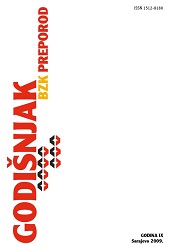Aktuelnost analize totalitarizma u Frankfurtskoj školi
Actuality of Totalitarianism Analysis in Frankfurt’s School
Author(s): Šefik BarakovićSubject(s): Philosophy
Published by: Bošnjačka zajednica kulture "Preporod"
Keywords: Totalitarianism; irrationality; ideology of Nazism populist atomized mass individuals; mass individual; loyalty; power; followers; authoritarianism; nationalism; authority relations; obedience; Führer-principle; leader
Summary/Abstract: Under the conditions of a mature liberalism, unbalanced aspects of civil dynamics, repressed flow of civil perspective, civil restrictions and processes of denial, in principle, confirmed, articulated and closed by nation, provide the space of rule or affirmation of irrationality predominance. Irrationality in civil historical relations has its place and function, in these relations it is objectivised its relevance, and also unbalanced development aspects of civil structuring contribute that irrationality controls and directs the force, and it is placed for measure of truth by realized, intensified, conducted pressure. Totalitarianism resulted from radicalization of nationalism as an instrument of nation domination, negates the individuality of a person. Within mature liberalism and particularly post liberalism, the trend of radical deindividualization of a person leaves the theory weak and not included in influence of positive social change and by this knowledge-oriented scientific research analysis, provides critical theory to competently enlighten phenomena and aspects of modern civil society. The tendency of civil development has set the civil power and possibilities of the theory, civil reality has changed its scope that the traditional meaning of theory and desire established for social change has been dysfunctional, and attribute “critical” has determined critical theory from other standpoints.
Journal: Godišnjak Bošnjačke zajednice kulture »Preporod«
- Issue Year: 2009
- Issue No: 1
- Page Range: 126-138
- Page Count: 13
- Language: Bosnian

